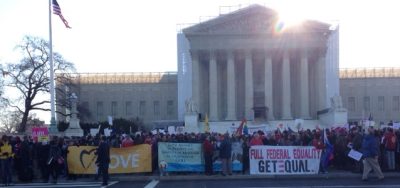Immigration Courts
Immigration courts play a crucial role in ensuring that immigration laws are applied fairly and consistently, providing due process to those facing removal. Learn more about issues facing the courts today and explore the actions we're taking to ensure the rights of immigrants are upheld and legal integrity is maintained.

Immigration Reform is an LGBT Issue
By Victoria Neilson, Legal Director, Immigration Equality. This week the U.S. Supreme Court is hearing oral arguments in two cases, Hollingsworth v. Perry and United States v. Windsor, that will forever change the course of the struggle for lesbian, gay, bisexual, and transgender (LGBT) equality. While we are hopeful that the Court will strike down the Defense of Marriage Act (DOMA) thereby clearing the way for the federal government, including U.S. Citizenship and Immigration Services and the Department of State, to honor our marriages, no one can predict with any certainty what the Court will do. Read More

How the Supreme Court Decision on DOMA Will Impact Immigration Law
Family unity is one of the driving forces in our immigration system. United States citizens and lawful permanent residents can obtain immigrant visas for their spouses. Many foreign nationals who come to the United States on employment-based visas bring their spouses and children with them. And some waivers and forms of relief from removal are available only to those with close relatives living in the United States. Read More

Hearing and Report Highlight Lack of Due Process in Immigration System
This week, Senator Christopher Coons of Delaware presided over a public hearing to discuss what so many of us know: the immigration courts are failing to provide a fair, efficient, and effective system of justice. Many of the concerns raised by Senator Coons, as well as some of the witnesses, during Wednesday’s Senate Judiciary Committee hearing, “Building an Immigration System Worthy of American Values,” are discussed in more detail in a report issued by the American Immigration Council this week, Two Systems of Justice: How the Immigration System Falls Short of the Ideals of Justice. Read More

Budget Cuts Led ICE To Release Immigrants From Detention
Along with every other government agency, on March 1, U.S. Immigration and Customs Enforcement (ICE) officials had to begin making mandatory cuts to their budget as a result of sequestration. ICE’s choice to shift some of its detainees from expensive detention facilities to non-detention alternatives was questioned yesterday by Members of Congress, but more importantly the decision demonstrates that alternatives to detention are a feasible choice—regardless of sequestration. Read More

Including LGBT Immigrants in Immigration Reform Helps Protect Vulnerable Individuals
Roughly 11 million unauthorized immigrants live in the United States, and their backgrounds and stories are incredibly diverse. DREAM activists helped to change the picture of the 11 million by shining light on young people affected by our broken immigration system, while grassroots movements are highlighting the stories of families. But a new report from the Williams Institute adds another facet to this picture: an estimated 267,000 undocumented adults identify as LGBT. Even more compelling, the report highlights the other struggles LGBT individuals face when dealing with the legal immigration system. Read More

Immigrants Deserve Basic Miranda-Like Warnings When Arrested
As anyone who has watched an episode of Law and Order knows, police officers must give certain warnings to anyone placed under arrest, including that they have the right to an attorney and that the statements they make can be used against them in court. In the 1966 decision Miranda v. Arizona, the Supreme Court explained that providing these warnings prior to police questioning ensures that criminal suspects are aware of their rights and therefore are better protected against the intimidation inherent in police interrogations. Read More

How Budget Cuts From Sequestration Will Affect The Nation’s Immigration System
The U.S.’s immigration system, already burdened by application processing backlogs and insufficient funding for immigration courts, could become even more unwieldy if the government must slash its budget on March 1. Sequestration – a package of across-the-board government spending cuts totaling $85 billion this year and $1.2 trillion over the next decade – likely will go into effect on Friday unless Congress and President Obama manage to reach a deal. Currently, there are no reports of ongoing negotiations to avert the automatic cuts, so when the cuts kick in, all aspects of the immigration system – from visas to deportations – would be impacted. Read More

SCOTUS Narrows Protections For Noncitizens Who Received Poor Legal Advice
Almost three years ago, in the landmark decision Padilla v. Kentucky, the Supreme Court acknowledged the severity of deportation and that our current immigration laws make “removal nearly an automatic result” for many noncitizens convicted of crimes. Consequently, the Court held that a criminal defense attorney must advise noncitizen clients about the risks of deportation if they accept a plea bargain. If the defense attorney fails to provide this advice, the noncitizen can seek to have the conviction set aside. Such recourse brings integrity to the criminal justice and immigration systems and ensures that immigrants who reasonably rely on advice from their lawyers are not unfairly held accountable for their lawyers’ mistakes. Read More

Shoddy Court Process Behind the Record Number of Deportations
The Obama Administration is on record for pursuing the toughest immigration enforcement policies in U.S. history, mostly evidenced by its record numbers of deportations. These numbers speak volumes: last year, nearly 400,000 people were deported from the United States. While these numbers are shockingly high and there has been much discussion about how these actions tear families and communities apart, there has also been an under-reporting of the unfair and often expedited process that leads to the deportation of hundreds of thousands of people each year. In fact, two-thirds of the individuals removed are done so without ever seeing the inside of an immigration courtroom and are not accorded many other basic due process protections. Read More

Survey: Asian Americans Concerned with Legalization, Family Backlogs
In the current debate, immigration is often depicted as a Latino issue. This is partially because just over half of America’s foreign-born population is from Latin America and the Caribbean, and the current political climate around immigration is largely seen as being driven by Latino turnout for Democrats in the 2012 election. But this depiction glosses over the millions of immigrants – documented and undocumented – who hail from other parts of the globe. Read More
Make a contribution
Make a direct impact on the lives of immigrants.
